 |
|
|
|
|
|
The campaign against the Swap Shop circus was one of ARFF’s longest. ARFF held dozens of demonstrations, purchased an anti-circus billboard across the street from the Swap Shop, and in other ways pressured the Swap Shop to consider entertainment that was not cruel and exploitive. |
|
 ARFF's billboard on Sunrise Blvd., near the Swap Shop |
|
| Although
Mr. Henn explained that the eviction was a result of a dispute
over contracts and insurance, we have no doubt that his decision
was made easier knowing that animal rights activists would never
go away. |
|
| How Can I Help? | |
| Please write to Preston Henn and thank him for discontinuing the circus:
|
|
| |
|
| It
is exciting that the Swap Shop has finally ended their financial
support of the circus; unfortunately, life for the animals in
the circus may not improve. The future of the Hanneford Family
Circus is uncertain. |
|
|
The
Elephants
Only a few months old, the elephants — "Carol," "Liz" and "Patty" — were shipped to the United States where they were trained to perform unnatural and degrading tricks. In the wild, young elephants nurse for several years. Female elephants stay with their mothers and with their family group for their entire lives. |
|
| For the elephants, decades of life with the circus has resulted in captivity-induced health problems. During an inspection by the U.S. Department of Agriculture, a veterinarian noted, "problems with foot condition, of all three elephants." Elephants in captivity regularly suffer from chronic foot and joint problems due to lack of proper exercise and from years of standing on hard surfaces. (Click here for a complete list of the Hanneford Family Circus' animal care violations.) It is clear that the basic needs of elephants can never be met in captivity (The world's leading elephant experts agree). Elephants used in circuses are also a public safety risk. In 1990, Carol crushed a circus worker to death at the Swap Shop. Since then, 11 humans have died and over 100 injured in incidents involving captive elephants in the U.S. |
|
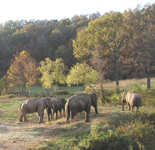 ARFF
has encouraged the Hannefords to retire the animals, who have
suffered long enough and deserve a peaceful retirement. Although
Carol, Liz and Patty can't be returned to the forests of their
birth, relocation to a sanctuary is a wonderful option. There
are two sanctuaries in the United States that offer exceptional
homes for elephants suffering from neglect, abuse or years of
confinement: The
Performing Animal Welfare Society in California and The
Elephant Sanctuary in Tennessee offer large, natural settings
(100+ acres) over which elephants can roam, forage and bond with
other elephants. ARFF
has encouraged the Hannefords to retire the animals, who have
suffered long enough and deserve a peaceful retirement. Although
Carol, Liz and Patty can't be returned to the forests of their
birth, relocation to a sanctuary is a wonderful option. There
are two sanctuaries in the United States that offer exceptional
homes for elephants suffering from neglect, abuse or years of
confinement: The
Performing Animal Welfare Society in California and The
Elephant Sanctuary in Tennessee offer large, natural settings
(100+ acres) over which elephants can roam, forage and bond with
other elephants. |
|
|
In the circus, virtually all of animal's natural behaviors are thwarted. When not performing, circus elephants spend most of their lives in chains. Click here for more information about circuses, including a list of animal-free circuses. |
|
|
|
1431 N. Federal Highway | Fort Lauderdale, Florida 33304 | (954) 727-ARFF



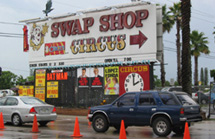 The
The
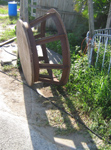 On
the day the circus left town, ARFF visited their abandoned quarters
at the back of the flea market’s parking lot. For the
first time in 16 years, the tiger cage, stalls for the circuses
horses and llama, and the pitifully small enclosure that was
“home” for three elephants were all empty!
On
the day the circus left town, ARFF visited their abandoned quarters
at the back of the flea market’s parking lot. For the
first time in 16 years, the tiger cage, stalls for the circuses
horses and llama, and the pitifully small enclosure that was
“home” for three elephants were all empty! 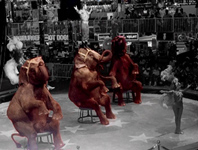 At
the Swap Shop, elephants were forced to perform circus tricks
up to three times per day, seven days a week. The elephants,
born free 33 years ago in Asia, have shown signs of suffering
from foot problems and other captivity-induced health conditions.
At
the Swap Shop, elephants were forced to perform circus tricks
up to three times per day, seven days a week. The elephants,
born free 33 years ago in Asia, have shown signs of suffering
from foot problems and other captivity-induced health conditions.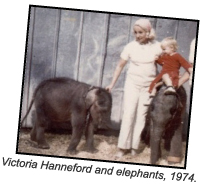 George
& Victoria Hanneford obtained three elephants in Bangkok,
Thailand in the early 1970s, before Asian elephants were declared
an Endangered Species (commercial trade in Asian elephants is
now illegal). At the time, it was not uncommon for poachers to
bring elephant calves to the city for sale to unscrupulous circuses.
George
& Victoria Hanneford obtained three elephants in Bangkok,
Thailand in the early 1970s, before Asian elephants were declared
an Endangered Species (commercial trade in Asian elephants is
now illegal). At the time, it was not uncommon for poachers to
bring elephant calves to the city for sale to unscrupulous circuses. Please,
never attend a circus with animals. Animals in circuses
live miserable lives of deprivation, confinement and abuse.
Please,
never attend a circus with animals. Animals in circuses
live miserable lives of deprivation, confinement and abuse.